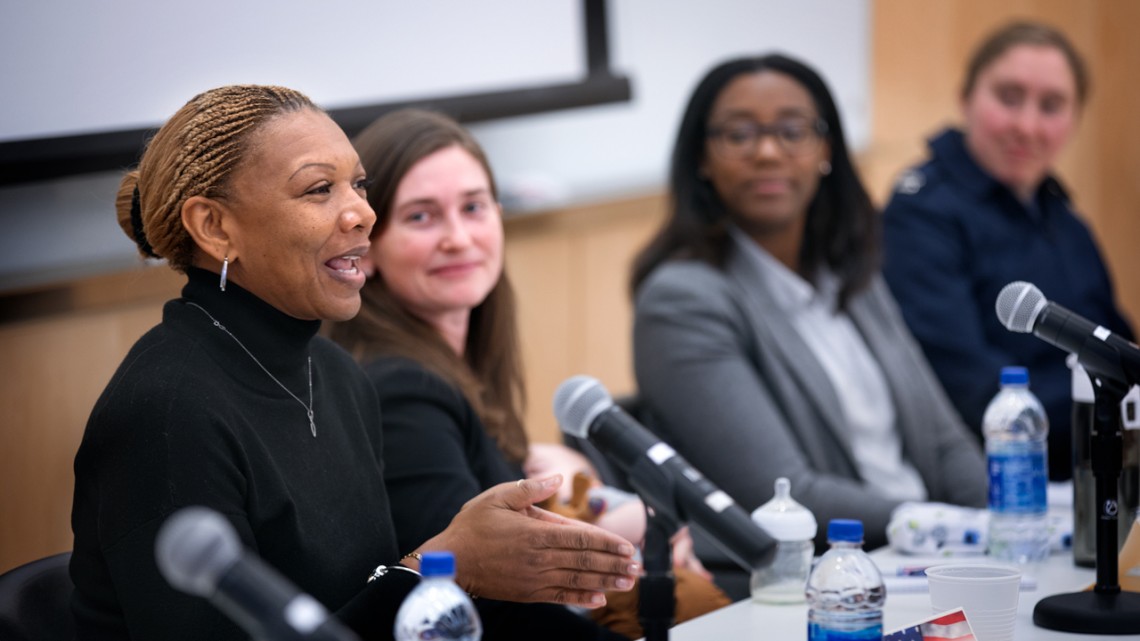
From left, Master Chief April Beldo, Shannon Boyle, Natoshia Spruill and Capt. Molly Heath at a panel of women who have served in the military.
Military women discuss service, careers
By Nancy Doolittle
Five military women with connections to Cornell along with retired Fleet Master Chief April D. Beldo described the many worlds they have bridged – as military leaders responsible for new recruits, as wives and mothers juggling family and work responsibilities, and as military officers who have transitioned to academia – in a panel discussion March 7 in Stocking Hall.
Their discussion centered on what it was like to be women serving in the military, some of them in combat units. But the advice they gave to their audience – many of whom were Reserve Officers Training Corps students – could apply to anyone seeking career advancement.
Women need to always avoid being caught off guard, said Capt. Molly Heath, veteran of the U.S. Air Force and now the recruiting flight commander for Air Force ROTC Detachment 50 at Cornell. “Double-knot your shoes,” she said, as a metaphor for not being perceived as one who holds back the group.
Natoshia Spruill, M.B.A. ’14, associate director of leadership programs at the Cornell SC Johnson College of Business and a U.S. Army veteran, urged women to always look and act professionally.
“Excel, excel, excel,” said Lt. Alicia Flanagan, U.S. Coast Guard, who is finishing her M.B.A. at Cornell before returning to military service as a government financial manager. “We depend on you to do your job.”
Beldo is a pioneer for women in many U.S. Navy roles – as the first female command master of an aircraft carrier, and first female master chief for naval education and training. She stressed self-reliance. “Don’t ever put your destiny in someone else’s hands,” she said.
When asked why they joined the military, Flanagan, Spruill and Maj. Amanda Minikus, J.D. ’15 – now the regional victims’ legal counsel-west, U.S. Marine Corps, who advocates for the rights of victims of sexual assault and domestic violence – said they wanted to do something different.
Minikus was a senior in high school when the U.S. was attacked on Sept. 11, 2001, and she joined the Naval Academy because she wanted to serve. And Flanagan was working in financial services during the 2009 U.S. financial crisis when she decided to attend the Coast Guard Academy in New London, Connecticut. After graduation, she completed her first tour of duty as deck watch officer conducting counter-illicit trafficking operations and protecting life and property at sea.
All five described the obstacles they had to overcome as women in the military, but they also noted the progress that has been made in military culture, citing equal pay in each rank and a generally supportive environment. Some found a voice in the military they said they never would have had in civilian life. Ultimately, “people follow good people,” regardless of “whether you’re female, male, white, black, Hispanic,” Minikus said.
They also noted that the military and higher education complemented each other in advancing their careers. Shannon Boyle, M.B.A. ‘19, now in the Army Reserve, said the military service gave her real-world experiences that she could apply to her classroom learning. Minikus also noted the broad academic perspective that active military personnel can gain while serving, which enriches their ability to lead.
They all agreed it is difficult to balance work and personal responsibilities in the military, especially if, like Boyle and Spruill, you have a young child. But other officers will pitch in to help you, and you will find support – even if you don’t find sleep, they said.
“There is never a right time” for starting a family, Spruill said, but “you will make it work.”
Media Contact
Get Cornell news delivered right to your inbox.
Subscribe
